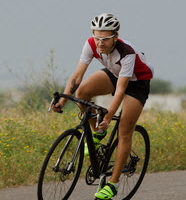Does Riding in a Bicycle Group Mean You Assume the Risk of a Fatal Accident?

Everyone who operates a vehicle on the road needs to exercise proper care for the safety of themselves and those around them. This applies not just to large vehicles such as cars and trucks, but also bicycles. Bicycle safety is especially important when riding in a paceline, i.e. a group of bicyclists who travel close together and takes turns “breaking the wind.” A mistake by any single rider can send the entire group crashing–and potentially cause a fatal accident.
Appeals Court Finds Trial Judge’s Math “Puzzling”
The Tennessee Court of Appeals recently addressed the question of a paceline rider’s liability for such accidents. This case arose from a 2014 accident on U.S. Highway 321 in Blount County. A five-member paceline was riding on the shoulder of the road. The victim was the fourth rider in the paceline. The defendants were in front of him, riding in the lead and second positions.
At one point during the ride, the second-position defendant’s front tire struck the lead defendant’s back tire, causing the former to wreck and fall. The victim attempted to swerve right to avoid a collision, but in doing so he “wound up flying off his bicycle and landing on his head,” according to court records. This left the victim a paraplegic for several months before he eventually died.
The victim’s widow filed a wrongful death lawsuit against the two defendants whose impact initiated this deadly chain reaction. The trial judge granted summary judgment to the defendants. While acknowledging this was “obviously a very tragic case,” he concluded “these types of accidents are foreseeable in bicycle racing, especially this type of close racing.” In effect, the judge said the victim assumed the risk of potential injury or death when agreed to ride in the paceline, and that meant his actions “were at least 50 percent of the cause of his own accident,” which bars recovery for personal injury under Tennessee law even if the co-defendants were at fault.
But the Court of Appeals said the judge’s conclusions were “puzzling and unsupported” by law. For one thing, the appeals court noted, there were five people riding in the paceline and there was no dispute that at least three of them–the victim and the two co-defendants–were involved in the crash. If the victim was “at least 50 percent responsible for his own accident simply for participating in paceline riding,” the Court reasoned, then surely the co-defendants “also must be at least 50 percent responsible simply by participating.” Obviously, that would add up to 150 percent, and “naturally, one cannot exceed 100 percent in an allocation of fault.”
More to the point, a victim’s “implied assumption of risk” is not a “complete bar to recovery” under Tennessee personal injury law. The Court of Appeals said the other paceline riders still had a “duty to act reasonably under the circumstances.” Accordingly, the appeals court reversed the grant of summary judgment and returned the case for trial.
Have You Been Injured in an Accident? We Can Help
Anytime that you are on the road you need to exercise care. And if another driver or bicyclist fails to “act reasonably” and harms you as a result, you should speak to a qualified Pigeon Forge accident lawyer who can review your case and help you decide whether to bring a claim for damages. Contact the offices of Fox, Farley, Willis & Burnette, Attorneys at Law, at (866) 862-4855 today.
Source:
tncourts.gov/sites/default/files/carolyn_crisp_v._michael_nelms_et_al..pdf
